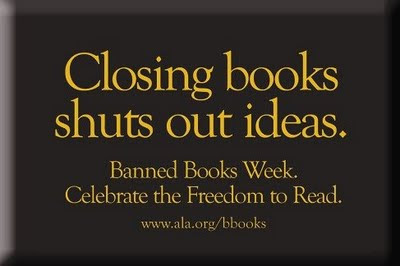According to the American Library Association, there were 348 challenges reported to the Office of Intellectual Freedom in 2010. Of course there are many that go unreported as well.
The most commonly challenged books of 2010 were:
1) And Tango Makes Three by Peter Parnell and Justin Richardson
2) The Absolutely True Diary of a Part-Time Indian by Sherman Alexie
3) Brave New World by Aldous Huxley
6) Lush, by Natasha Friend7) What My Mother Doesn't Know by Sonya Sones
8) Nickel and Dimed by Barbara Ehrenreich
9) Revolutionary Voices edited by Amy Sonnie
The he books I've read off this list are indicated in blue, and I've linked to reviews when present on In The Next Room.
How many of these books have you read? How many have you been told to avoid because somebody didn't approve of them?
Although challenges to literature in the United States tend to get the most publicity, it's not unheard of in Canada either. According to the Canadian Library Association, there were at least 74 challenges to books, magazines, other resources such as DVDs and even library policies in Canadian libraries in 2010. A full list of the known challenged titles can be found here. Books challenged include the entire Harry Potter series, The Adventures of Huckleberry Fin by Mark Twain and both American Gods and M is for Magic by Neil Gaiman. Canada has its own version of Banned Books Week called Freedom to Read Week and it will be celebrated February 26-March 3, 2012 (and hopefully I'll remember to do something for that as well!)
When you ban a book, you aren't just shutting out a single idea. You're blocking off everything that book could have inspired, every good action that comes from something you disapprove of: the teen who stays away from drugs after reading Crank, or recognizes the importance of a democracy after reading a novel like The Hunger Games or Brave New World. We may not agree with the language or message behind books such as The Adventures of Huckleberry Fin and Mein Kempf, but preventing people from reading them closes off the discussion of what makes racism and antisemitism wrong- it says that it is not worth talking about. Reading and talking is how we learn and grow. You may not agree with a book, but every book has something unique to offer, and if you ban it, that can never be replaced.
To learn more visit http://www.bannedbooksweek.org/





No comments:
Post a Comment
Your comments make my day!